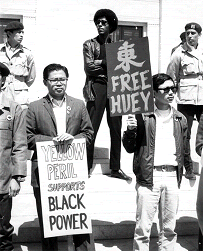Yellow Peril Supports Black Power
I was doing some research on black American history last night when a Google search revealed this:
How has photography shaped our ideas of race? That's the question posed in Only Skin Deep: Changing Visions of the American Self edited by Coco Fusco and Brian Wallis (Abrams, $40), the catalog for a national touring exhibit prepared by the International Center of Photography (in New York through February 29, with stops in cities like Seattle, San Diego, and Columbus, Ohio). ... Roz Payne's 1968 "Yellow Peril Supports Black Power," in which Asian men hold protest signs in support of black activist Huey Newton, the book captures the visual ironies of race in America.After I read that I HAD to find the photo. It took a couple of searches, but I managed to find it on a web page for an Asian American Pacific Islander Studies course here:

I just think it's a great photo.
Here is a link to Roz Payne's Archives online: Roz Payne's Archives
Here is the Wiki link explaining the history behind the term "yellow peril".
Here is a short Huey Newton bio from Encarta. Sphere: Related Content












Hi, The original image can be found in Roz Payne's online archives. There are plenty of fantastic images there. Check it out: http://www.newsreel.us/
ReplyDeleteI believe that the Yellow Peril pic you have on your site is a part of his Black Panthers throughout the Years series.
It's a great picture and expresses so much about that era which is lost on people who've not bothered to look it up.
ReplyDeleteThere is a great article in the current issue (Fall 2008) of
American Legacy magazine has a then and now feature of the Freedom Riders of 1961. Reading about why they chose to go and what they did with their lives was inspirational.
When I look at the "yellow peril" picture, the racial divides that people try to throw up seem petty. People have much more in common than not.
Thanks for the link. I hope people head over to the site to check out more photos. I'll move the link into the actual post and hyperlink it here too: Roz Payne's Archives